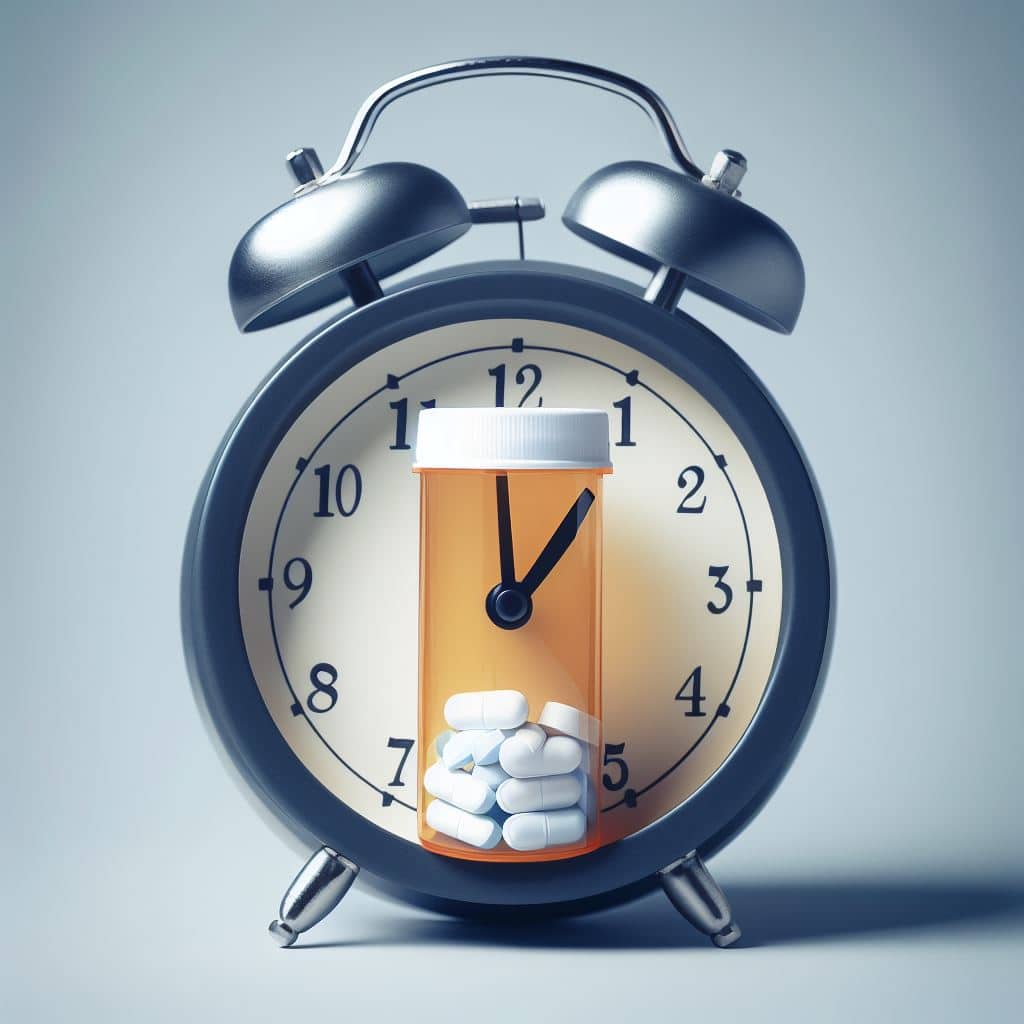Your healthy body and mind work as a catalyst in building the castle of your happy life. However, this catalyst needs periodic repair to ensure that you stay in good health. There are certain situations when there arises the need for medical intervention to fuel up your catalyst power. This involves the use of prescribed medications that speed up the recovery process. While these medications are for our relief and recovery. It does come with some hidden effects as well, which need your attention and care. Get to know more about Benzo Withdrawal Timeline in the blog.
Benzos is one such medication that is prescribed by medical experts to provide relief during medical conditions like anxiety, or insomnia. But it’s important to know that it can be addictive and have some negative effects on your mind and body.
This blog will educate you about Benzo’s withdrawal and how can you help yourself with an easy withdrawal by taking informed actions.
It’s tough, but help is closer than you think!
Understanding Benzo Withdrawal
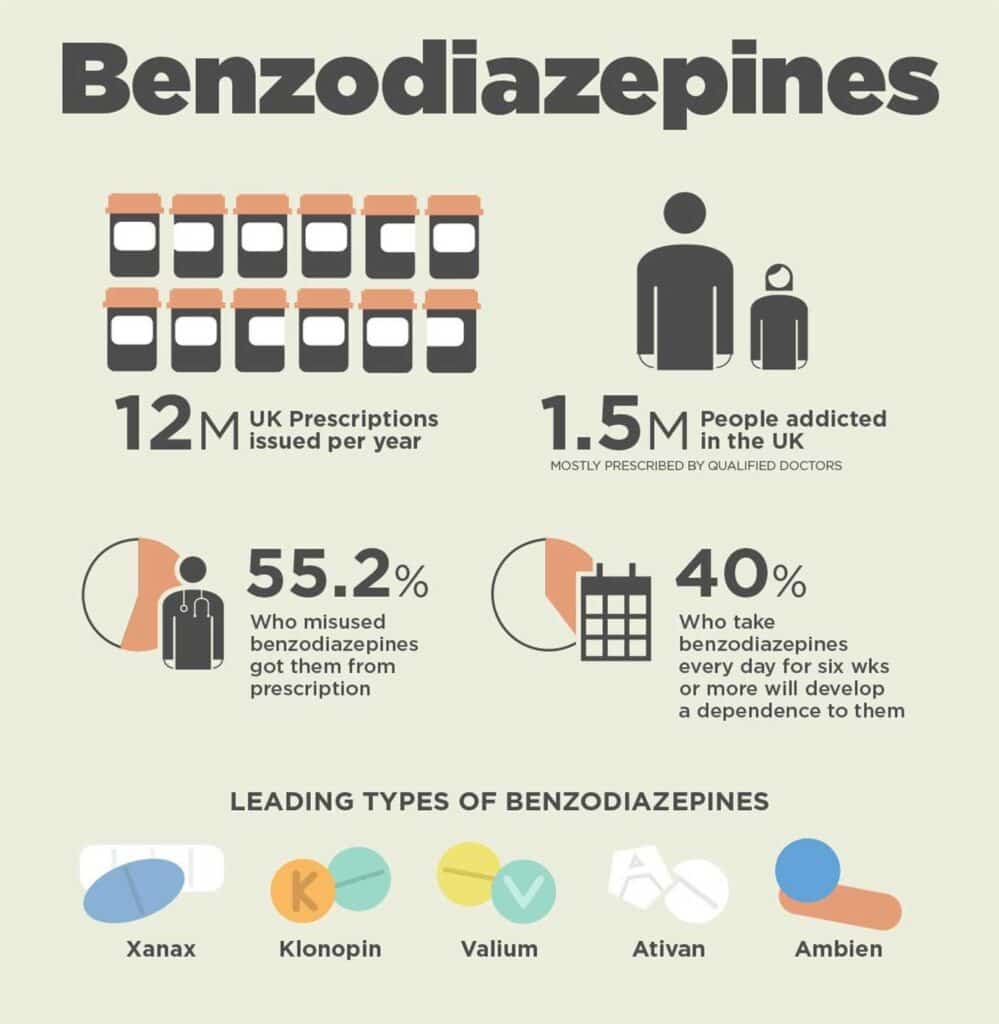
The Drug Enforcement Administration (DEA) recognizes benzodiazepines as sedatives and tranquilizers, prescribed to treat symptoms of insomnia, anxiety, panic, seizure disorders, and muscle tension or anxiety or sleeping issues.
In Benzo withdrawal, individuals who have been using the drug as part of a medical prescription find it difficult to discontinue its use, even after recovery. If you suddenly stop using it, you might experience some unusual symptoms or a reappearance of old ones.
It functions like alcohol in the way it interacts with the central nervous system. It causes a surge of dopamine in your brain. When you stop its consumption, your dopamine levels drop and you start to experience some effects. These are identified as withdrawal symptoms.
What are withdrawal symptoms?
When a person abruptly stops or reduces the amount of benzo dosage, they may experience a variety of physical and psychological symptoms. These are withdrawal symptoms that range from mild to severe and can be a source of distress. The severity and frequency of these symptoms vary depending on the stage of withdrawal.
Research indicates that roughly one-third of those who take benzodiazepines for six months or more are liable to experience muscle spasms, insomnia, tension, and hypersensitivity upon discontinuing use. If left untreated, these symptoms can develop further, leading to whole-body seizures.
Benzo Withdrawal’s symptoms list
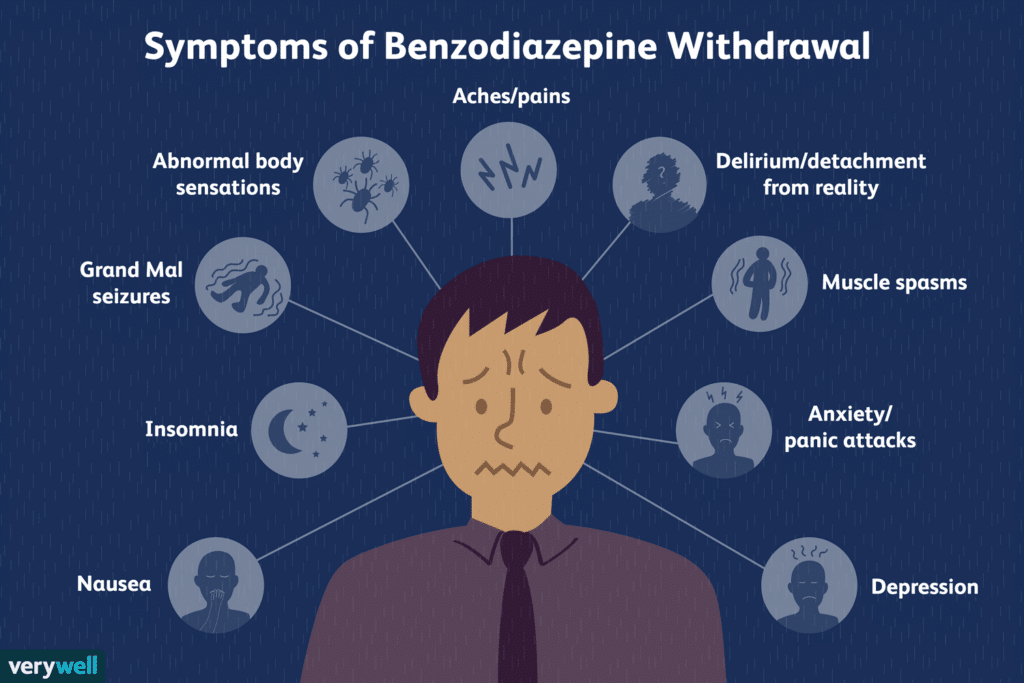
Some common signs and symptoms of benzodiazepine withdrawal involve trouble concentrating, sweating, and pain in muscles and joints. There are various physical and psychological symptoms associated with the withdrawal.
Physical symptoms
- People with benzodiazepine abuse often experience a rebound of their anxiety, which is worse than it was before they began taking the medication.
- Insomnia, marked by difficulty falling asleep
- Sudden and frequent shaking or quivering of muscles
- Headaches, unusual pain in the head
- Nausea and diarrhea
- Feeling dizzy
- Heartbeat becomes fast
- Blurred eyesight, finding it difficult to see clearly
- tingling in arms and legs
- cognitive deficits
Psychological Symptoms
- Feeling depressed and isolated
- Easily getting irritated and angry without any reason
- Feeling uneasy and restless
- Getting frequent panic attacks
- Rapid mood swings
- Lack of concentration and interest
Research by the British Pharmacological Society indicates that Benzodiazepine use for as little as 3 to 6 weeks, even while adhering to therapeutic doses, is associated with the development of physical dependence, with between 15–44% of chronic benzodiazepine users experiencing protracted moderate to severe withdrawal symptoms upon cessation.
In addition to these symptoms, the addict also has intense urges to take the drug or other medications to relax. These urges bring the drug back into the addict’s life.
Phases of Benzo Withdrawal
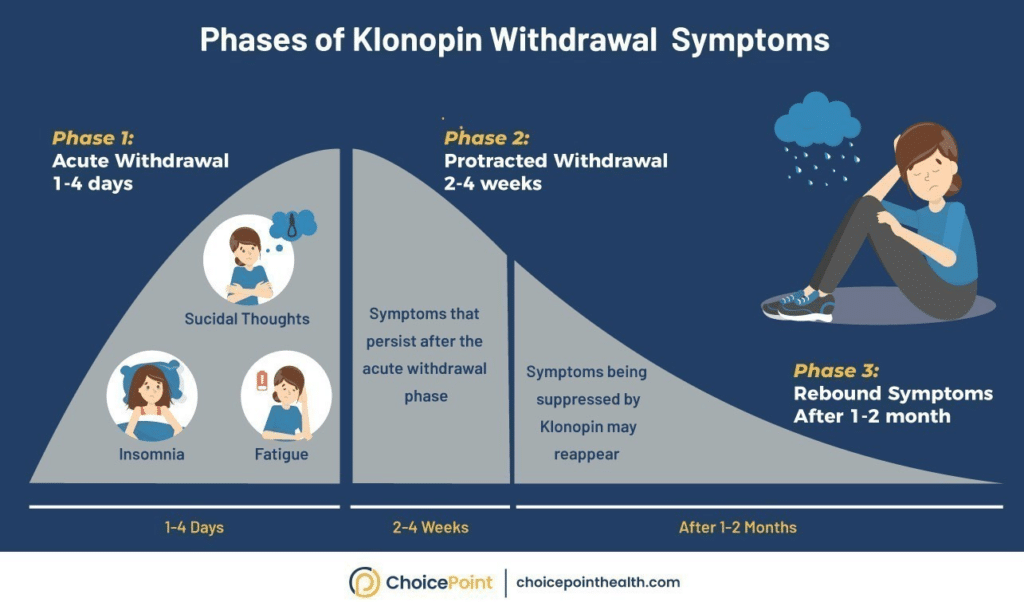
There are three stages of Benzos withdrawal symptoms. Before taking any crucial action, it’s necessary to figure out which stage you’re in.
The Onset Phase
This is the initial stage of Benzodiazepine withdrawal. You might experience a re-emergence of anxiety and insomnia as your brain adjusts to a drug-free environment. It is usually accompanied by a rebound period, where you’ll start to feel the same symptoms you were using the drug for. It usually starts within a couple of days after you stop taking it.
During the rebound, the person starts feeling the older symptoms again for which the drug was being consumed. It begins within a few hours to a few days after stopping the medication.
Symptoms of Onset Phase
- Rebound anxiety: It is one of the most common signs of Benzo’s withdrawal, it usually comes in the form of intense feelings of stress, worry, and fear.
- Insomnia: feeling restless and having difficulty falling asleep
- Irritability and agitation: getting easily annoyed, frustrated, or angry
- Concentration issues: finding it difficult to concentrate on tasks or remember information.
- Muscle tremors: Sudden occurrence of trembling in the hands, arms, or legs
- Headaches: Pain in heat from mild to severe
However, the onset phase is considered to be temporary. With proper management and support, you can successfully navigate this period and transition off benzodiazepines.
Acute Withdrawal Phase
In this stage of withdrawal, the symptoms are at their peak level. Therefore it is characterized as challenging and the most difficult to manage phase. It is when your symptoms start to get worse and new, more serious ones start to show up. It usually starts after you’ve stopped taking your medication, usually 7 to 14 days after you start to feel the withdrawal symptoms. Usually, you’ll have them for 5 to 28 days, but some people have them for a few months. That’s usually the main part of the withdrawal.
Symptoms of Acute Withdrawal
- Weight loss due to decreasing appetite level
- Intensified rebound anxiety: It increases anxiety, leading to panic attacks, and makes one disconnected from reality.
- Worsening rebound insomnia: Extreme fatigue, trouble sleeping, inability to fall asleep
- Severe and frequent nausea and vomiting
- Excessive sweating causes discomfort and disrupts daily activities.
- increased irritability and trouble concentrating.
- Muscle aches, fever, headaches
- muscle spasms or tension
- seizures, hallucinations, short-term memory impairment
- Mood swings
Protracted Withdrawal phase
This phase doesn’t affect everyone going through this condition. Some people don’t feel any withdrawal symptoms at all after the acute withdrawal phase. Others may find they still feel some withdrawal symptoms for weeks or even months. As per the research study conducted on benzo withdrawal, between 10–25% of chronic benzodiazepine users suffer protracted withdrawal symptoms upon cessation
Symptoms of PAWS
- Cognitive impairments: difficulty making decisions and lack of concentration and focus
- Mood disturbances: marked by anxiety, depression, irritability, and mood swings.
- Becoming sensitive to emotions, feeling none or over emotions
- Trouble in achieving or maintaining a deep and restful sleep
- Feelings of fatigue, muscle rigidity, headaches, and hypersensitivity to pain.
- Impairment of visual, auditory, tactile, and sensory sensitivities.
Factors affecting the Benzo withdrawal timeline
The amount of time it takes to get rid of your benzodiazepine can vary depending on a few things including the type of benzodiazepine, the dosage, the length of use, and individual metabolism.
Here are some other factors that determine how long Benzo’s withdrawal symptoms last
- Duration of consuming Benzo drugs
- Amount of dosage taken
- Misuse of prescription
- Unprescribed use or abuse of drug
- Having a pre-existing mental health condition or disorder
- Taking other drugs parallel
- Misuse of other drugs or alcohol
- Type of benzos drug taken
- Individual metabolism plays a role in the elimination rate of benzodiazepines from the body. Slower metabolisms can lead to a build-up of the drug in the body, resulting in delayed withdrawal symptoms.
Slowing down benzodiazepine use under the supervision of a physician can significantly reduce withdrawal symptoms and the length of time it takes to recover from a benzodiazepine overdose.
Key Cause of Benzos Withdrawal
Benzos withdrawal might arise due to various reasons, one of them being drug abuse and misuse. Data from the National Institute on Drug Abuse show that 11,537 overdose deaths involving benzodiazepines occurred in 2017. Approximately 85% of the 2017 overdose deaths involving benzodiazepines also involved an opioid. Therefore, Coprescribing benzodiazepines with opioids can be another reason for the severity of withdrawal syndrome due to the increased risk of respiratory depression.
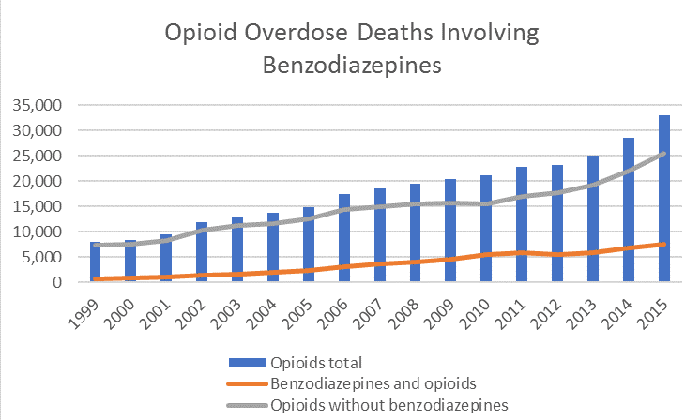
Other reasons can be:
- Due to a family history of drug dependency
- A prior history of addiction to benzodiazepines
- Life events or persistent stress can lead to an exacerbation of withdrawal symptoms, thus making it more difficult to manage and delaying the healing process.
- Increased physical dependence on having high doses of drugs in the system
Managing Benzos withdrawal
Benzos withdrawal can be a difficult time, but it doesn’t last forever. With the right steps and advice, you can overcome this condition and come out of it stronger. The best way to manage benzodiazepine withdrawal is to take a slow and steady approach, gradually decreasing the intensity of the withdrawal symptoms and letting your body adapt at its own pace.
Management of withdrawal involves nurturing mental well-being by maintaining a healthy lifestyle. Prioritizing a balanced diet, regular exercise and adequate sleep can help you reclaim your well-being. These habits not only support overall well-being but also promote healing and recovery.
Here is what you need to do if you’re facing Benzos withdrawal:
1. Medical detox
If you’re struggling with Benzos withdrawal, it’s important to gradually reduce your dose in a way that you can manage. Most people who are aware of their condition may stop taking benzodiazepines suddenly, but this can cause more serious withdrawal issues. Instead, it’s suggested to work with your healthcare provider to develop a tapering schedule that will gradually help you break away from the addiction
2. Therapies
If you are not comfortable with the use of medication or drugs to manage your symptoms, you may wish to consider alternative therapies. A study by the National Institute of Health suggests that patients who may need maintenance therapy are those who are on a high diazepam equivalent dose, have a range of aberrant drug-related behaviors (especially doctor shopping), and have a chaotic social setting or unstable psychiatric diagnoses. Therapies, like counseling and CBT, can be beneficial in this situation.
However, If the symptoms are becoming severe and unmanageable, it’s advisable to consult medical help instead of prioritizing therapy.
3. Join support groups
It’s believed that conditions like this break you mentally more than physical changes. Therefore it’s important to build strong mental strength during this situation. Joining a support group can make you realize that you are not alone in this journey and with the right mindset you can come out of it stronger and healthier. It will become your greatest source of strength and inspiration during times when you are fighting it head-on.
4. Lifestyle modifications
No medications or remedies work when you are internally unhealthy. To ensure a rapid recovery, it’s essential to adapt to lifestyle modifications that promote improvement. Some lifestyle modifications you can practice in your life are being more mindful towards sleep, exercise and a healthy balanced diet.
5. Self-Care Practices
If you prioritize self-care, like relaxation, mindfulness, and hobbies, you can help reduce stress and anxiety, and boost your emotional health. Deep breathing and muscle relaxation can help soothe the nervous system and reduce anxiety. Additionally, Mindfulness meditation can help you stay in the present moment, reduce your negative thoughts, and help you accept your emotions. Enjoying hobbies can help distract you from withdrawal symptoms and give you a sense of meaning and fulfillment.
Apart from the above remedies, if the condition doesn’t show any signs of improvement, it’s recommended to consult a professional for addiction treatment.
The Don’ts of Benzos Withdrawal Protocol
- Don’t abruptly stop benzo usage, it can lead to severe and even life-threatening withdrawal symptoms. It is important to seek advice from healthcare providers to develop a gradual tapering plan to minimize withdrawal symptoms.
- Don’t increase your Benzo dosage, it can make it harder to taper off in the long run and can lead to dependence and addiction.
- Some medications or substances can interact with benzodiazepines and worsen withdrawal symptoms. So don’t take any medication or substance without talking to your healthcare provider, including Benzo Withdrawal supplements
- Avoid consuming caffeine and alcohol during withdrawal, it can worsen the symptoms and increase the anxiety level
- Avoid smoking during withdrawal.
- Don’t isolate yourself, it’s important to stay connected with friends, family, and support groups during withdrawal.
- Avoid driving or operating machines during this condition as the symptoms impair coordination levels and disrupt focus.
- Avoid making major life changes during this time as it can be stressful and pressurizing for the mind
Benzo withdrawal timeline
Benzos withdrawal timeline differs from person to person as well as their symptoms and the type of drugs being taken. According to research, Withdrawal phenomena appear to be more severe following withdrawal from high doses or short-acting benzodiazepines. Addiction to alcohol or other sedative substances may increase the likelihood of developing benzodiazepine dependence.
For benzodiazepines with a shorter duration of action, such as Xanax, the withdrawal process may begin within a few hours of discontinuing the drug. For longer-acting benzodiazepines, like Valium, the onset of symptoms may take several days.
- Day 1 of withdrawal: The first symptoms of withdrawal, such as anxiety and sleeplessness, may appear within 6-8 hours of discontinuing use. This is dependent on how quickly the substance is removed from the body.
- Day 1-4: People who use longer-acting Benzodiazepines start feeling the first signs of withdrawal during this time. During this period, you may experience severe sleeplessness and heightened anxiety. Other common symptoms that peak at this time include elevated heart and breathing rates, sweating, and nausea.
- Day 10-14: Typically the withdrawal symptoms continue for at least 10-14 days before fading away completely. The withdrawal symptoms associated with longer-acting benzodiazepines start to kick in during this time and typically dissipate within 3 to 4 weeks after the due date.
- Day 15: At this stage, post-acute symptoms might show up which can be managed by practicing tapering of drug use under a medical expert.
Real-life stories of withdrawal warrior
When time gets tough, a lot of negative thoughts creep into our minds. Not only can these thoughts take over your mind, but they can also stop you from getting better. So, the next time you’re feeling down and alone, check out the stories of how people have made it through tough times and turned it into something positive.
Today we are going to hear the story of a withdrawal warrior named Alex who successfully reclaimed his life from the grip of benzodiazepines. With his determination and the support of loved ones, Alex returned much stronger from his journey of healing
Here is what he did to win over this withdrawal syndrome
- Alex began a gradual tapering plan, slowly reducing his dependence on the medication.
- He found a way to solace and motivation in the support group sessions at BAT.
- He also sought cognitive behavioral therapy (CBT) to address the underlying issues that led to self-medication.
Surrounding himself with supportive friends and family instead of isolating himself, he continued to make progress, slowly but surely breaking free from the addiction. People around him recognized the importance of self-compassion and understanding, he realized that setbacks were a part of the healing process.
Alex’s story is a testament to the power of courage, determination, and self-compassion in the face of addiction. His journey serves as an example to others struggling with similar challenges, demonstrating that recovery is possible and that with the right support, anyone can overcome their demons and reclaim their life.
Word of advice from Withdrawal survivors
Carol, a Benzo addict who was on Klonopin for 7 years, was originally prescribed for a seizure from a head injury, which completely messed up her life. While sharing her withdrawal story she mentions how her journey wasn’t short and sweet, or that it was easy and painless, but now when she recalls, it all seems to be worth it. She is grateful for winning back to her healthier her who feels no anxiety, no panic
Message from Carol- “Eat a healthy diet, be patient with your body, and look to the future rather than the past. And, the most important thing is prayer and faith. You can make it through this, but it’s much harder alone. Also, if you’re stressing your body further by smoking or drinking, stop. I didn’t drink but I did smoke, and once I quit my recovery went much better.”
Jim also shares his withdrawal journey of how three years ago he had a series of panic attacks, caused by lack of sleep and too much compensatory cigarette smoking and coffee. From then to Now, 19 months along, he feels his true self, he has found the healthier him
Advice from Jim- Through it all, from the beginning of tapering, I followed a program of running three times a week; daily meditation using relaxation and visualization tapes and techniques; vitamins; and diet. He gave up caffeine, cigarettes, most sugars, and alcohol); and prayer. He feels like a changed person now, healthier and stronger.
Your Journey to a Brighter Tomorrow
Conclusion
Benzo’s situation can happen to anyone, and it’s normal to feel overwhelmed. But that should not be your reason to give up. The success stories of benzo warriors are evidence of the fact that you should not completely rely on medicines for recovery. Healing and recovery start from the mind first then the body and your mind and body have a lot to do with what you say.
This is why it’s always said, “Speak up and show yourself positivity.” Because you never know what phrases your mind will come up with and pick up on. In addition to being mentally strong and positive, it’s also important to be aware of yourself. Being aware and educated about the issues you’re facing is crucial for understanding your situation, and you’ll be able to get better help if you communicate it.
It’s easier to panic in a situation like this and a lot tougher to stay strong. But these are times when you are not fighting against the disease but yourself. The process of recovery will not only help you win over this condition but from your fear and anxiety as well. Therefore, it’s important to not keep everything within yourself during these times when your mind has already overloaded
It is important to be honest about your unbalanced condition and to seek help right away. Don’t trust unreliable sources and don’t take any action without medical supervision. You may be pulled into this situation, but you can fight your way out of it with your strength. So, stand firm and take the right steps with compassion and love.
Calusa Recovery has their top-rated rehab facility in Florida and it has a group of professionals that address your benzodiazepine concerns and mental health needs. We provide an open opportunity to our clients where they can participate in dynamic and innovative group counseling 3 to 5 days per week, depending on their schedule. We offer tailored programs and treatment solutions that are personalized according to the patient’s immediate requirements.

